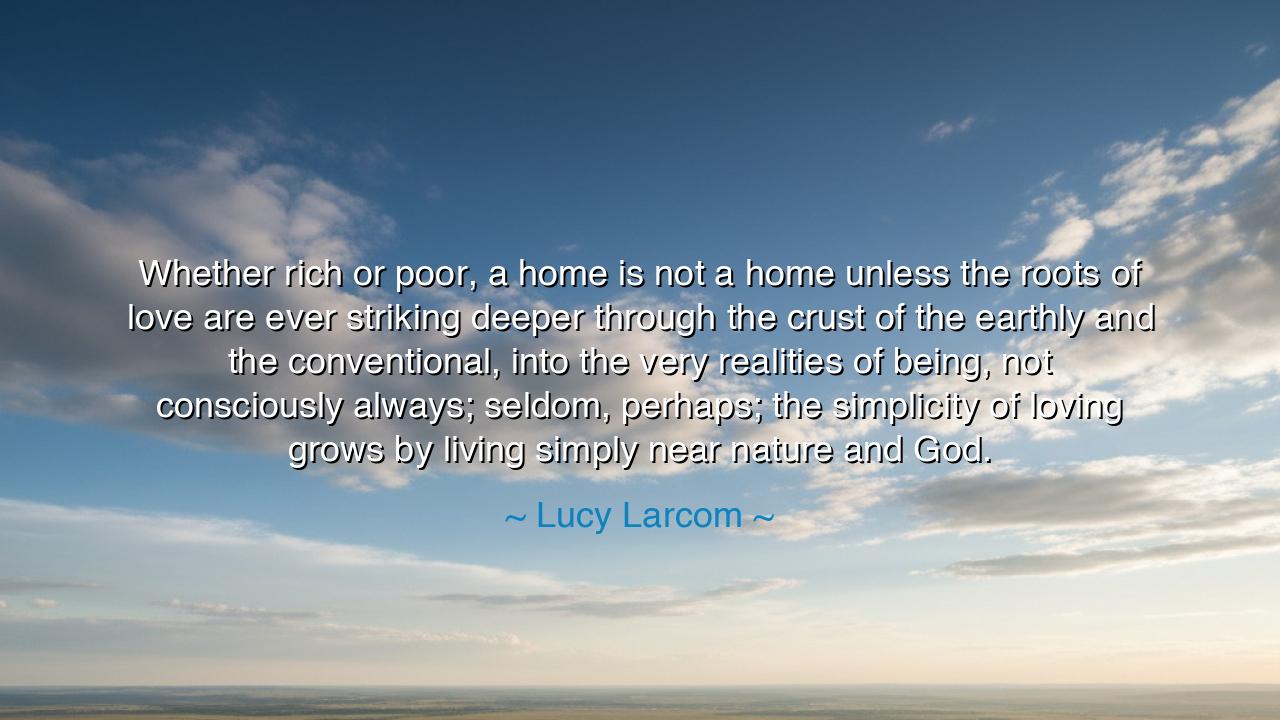
Whether rich or poor, a home is not a home unless the roots of
Whether rich or poor, a home is not a home unless the roots of love are ever striking deeper through the crust of the earthly and the conventional, into the very realities of being, not consciously always; seldom, perhaps; the simplicity of loving grows by living simply near nature and God.






The words of Lucy Larcom, “Whether rich or poor, a home is not a home unless the roots of love are ever striking deeper through the crust of the earthly and the conventional, into the very realities of being...” echo through time like the voice of a wise elder speaking to the hearts of humankind. They remind us that the essence of home lies not in the splendor of walls nor the abundance of wealth, but in the living pulse of love that binds souls together. To dwell within a mansion without affection is to wander in a gilded desert; to live in a cottage suffused with tenderness is to inhabit a paradise upon earth.
In Larcom’s day—the 19th century—the world was shifting swiftly from the simple rhythms of nature to the mechanical heartbeats of industry. Families, once bound by shared labor and faith, were being scattered into the clamor of factories and cities. Against this tide, Larcom lifted her voice like a prophet of the hearth, reminding all that true wealth is not measured in coin, but in the depth of love that endures beneath the surface of daily convention. She perceived how easily the heart could be hardened by the “crust of the earthly”—the pride of possessions, the busyness of society, the shallow customs that pass for affection.
To strike “deeper into the very realities of being” is to love not for appearance, nor for duty’s sake, but because the soul recognizes another as its own reflection. Such love, like the roots of an ancient oak, reaches into unseen soil, drawing strength from the eternal. It is not a passion that burns and dies, but a quiet flame that deepens with time and weather. It is the love that endures quarrels, sickness, and age—the love that transforms a mere dwelling into a home sanctified by spirit.
Consider, for example, the story of Abigail and John Adams, the second President of the United States and his steadfast wife. Though parted for long years during the birth of a nation, their letters burn with the steady fire of devotion. They had little wealth at times, and the world’s affairs pressed upon them heavily. Yet in their words—filled with faith, longing, and shared vision—we see the roots of love striking deep through the hardships of history. Their home, even when distant, was made real by the unseen thread of their affection and belief in God’s providence. Thus, Larcom’s truth shines in their lives: the simplicity of loving grows by living simply—faithful, enduring, near to what is divine.
To live “near nature and God” is to return to what nourishes love’s roots. In the hush of morning light, in the honest toil of daily life, and in the sacred stillness of prayer, the heart learns humility and gratitude. The ancient sages taught that one who knows the soil knows the soul; that to tend a garden, or raise a child, or mend a roof with care, is to honor the divine order of life. Simplicity does not mean poverty—it means purity of purpose, a heart uncluttered by vanity, open to grace.
The lesson, therefore, is plain yet profound: if you would have a home, nurture love as one tends a living tree. Speak kindly when it is hard to do so. Forgive swiftly, for resentment is frost to the roots. Let the winds of trial strengthen, not uproot, the bonds between you. Seek truth together, pray together, and walk often in nature’s quiet paths, for there the voice of God still whispers to those who listen. Remember that love, like any root, must grow downward to grow upward—it must find depth before it can bear fruit.
So, my child, when you look upon your dwelling, do not ask whether it is large or small, rich or poor. Ask instead: “Are the roots of love alive here? Do they strike deeper each day?” For if they do, then though your roof be humble and your floor unadorned, you live in a palace of light. And should the day come when the house itself crumbles, still will your home endure—in the hearts you have touched, in the peace you have planted, and in the eternal dwelling prepared for those who live simply, lovingly, and close to God.






AAdministratorAdministrator
Welcome, honored guests. Please leave a comment, we will respond soon